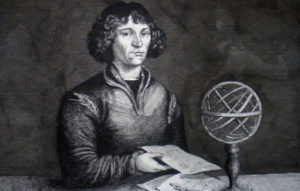
Nicolaus Copernicus (1473 – 1543) can be equated with the person who’s work began the Scientific Revolution in Europe in the sixteenth century. Although people think of Copernicus as a scientist he was really more of an intermediary between the ancient philosophers and modern scientists. He did not carry out experiments or make any meaningful observations of the heavens. Instead he had an idea for a model of the universe that he believed was better than any previous idea, and it happened to turn out to be correct.
Copernicus was born in Torun, a Polish town, and was the son of a wealthy merchant. He eventually moved to Italy where he studied in universities there and was influenced by the humanist movement occurring at the time. It was there he read a book by a German mathematician known as Regiomontanus called Epitome of the Almagest, where inconsistencies of the Ptolemaic model were pointed out. This created doubt in Copernicus’ mind about the accuracy of Earth centered Ptolemaic model of the universe and he began to formulate an outline of a heliocentric model when he had mostly complete by 1510.
Copernicus’ model was much simpler than the Ptolemaic model in that it eliminated the need for the many cumbersome equants, epicycles, and deferrents needed to make the model work. Despite its elegance, Copernicus delayed in publishing his work until the year that he died in 1543 when he published On the Revolution of the Celestial Spheres. His delay in publishing was probably due to fear of criticism. While it did provide a workable model of the universe it also raised many questions (both theological and physical) that Copernicus would have had no way of answering. It was because of these questions that the Copernican model took almost a century to become widely accepted when the invention of the telescope proved inconclusively that his model was correct.